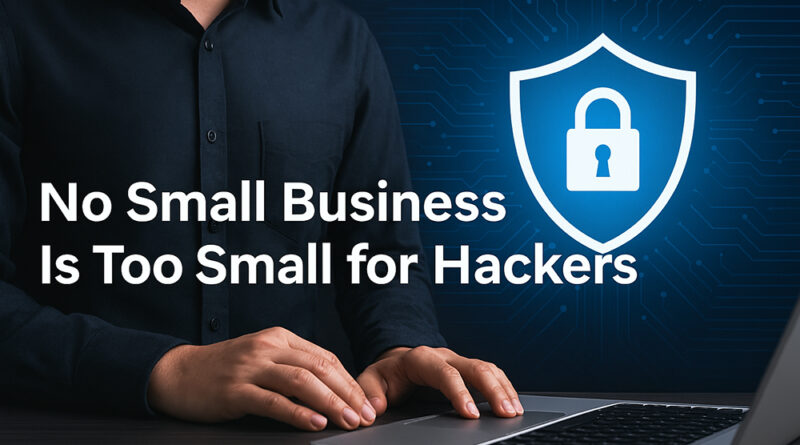No Small Business Is Too Small for Hackers: An Urgent Wake-Up Call for SMBs
It’s easy to think that if your business is small, hackers won’t have you on their radar. I’ve sat through countless cybersecurity presentations, met with business owners, and written extensively on digital security, and one thing remains clear: the “small target illusion” is a dangerous myth. As Senthil Ramakrishnan from AT&T aptly put it, many cyberattacks are aimed at small and mid-market businesses because, quite frankly, their defenses are often lacking.
Cybercriminals are not necessarily targeting your business specifically. Instead, they cast a wide net, exploiting any vulnerability they can find—and when your business is one of thousands with weak security measures, you’re exactly where they want to be. Even a single compromised SMB can become a profitable piece of a larger scheme. Whether it’s malware installation through a compromised website or a phishing email slipping past inadequate filters, every unchecked gap is an invitation for trouble.
The Economics of Cybercrime: Why Small Isn’t Safe
Consider this: Hackers operate like any savvy marketer, using low-cost, high-volume tactics. Email-based attacks, for instance, cost almost nothing to deploy. With each small business that falls victim, hackers accumulate valuable data—data that can be leveraged for everything from ransomware to direct financial theft. The case of Fazio Mechanical Services, which once served as an unintentional gateway to a massive breach at Target, underscores that a single small breach can have outsized consequences.
The reality is that cybercriminals are not after targeted, high-profile enterprises alone; they are after the cumulative gains from numerous smaller targets. This numbers game means that even if your business seems insignificant on the map, your lax cybersecurity could provide an easy entry point for hackers looking to profit off of aggregated small breaches.
8 Security Best Practices Every Small Business Must Adopt
It might seem overwhelming to overhaul your cybersecurity posture, but the good news is that securing your business doesn’t require a Fortune 500 budget or a dedicated IT department. Here are eight best practices that can significantly reduce your risk:
-
Keep Your Systems Updated:
Software vendors frequently release patches to fix vulnerabilities. Staying current with updates ensures that your systems aren’t left exposed to known exploits. -
Ensure Robust Email Malware Filtering:
Most major email services have strong filtering in place, but if you’re running your own server, invest in anti-malware extensions to keep malicious emails at bay. -
Limit Admin Privileges:
It’s tempting to grant every employee full access, but doing so essentially puts everyone in “god mode.” Restrict administrative rights to minimize accidental or deliberate installation of harmful software. -
Deploy Endpoint Security and Firewalls:
Use comprehensive endpoint security solutions and configure firewalls with intrusion mitigation tools. These measures act as a first line of defense against external threats. -
Restrict Downloads and Software Installations:
Implement policies that control what can be downloaded or installed on your network. Educate employees to heed their “Spidey sense” when something feels off. -
Maintain High Situational Awareness:
Be vigilant. Don’t click on suspicious links, open unsolicited attachments, or ignore inconsistencies in URLs. A cautious approach to online interactions can prevent many common threats. -
Regularly Back Up Your Data:
Ransomware attacks are on the rise, and having reliable, up-to-date backups can mean the difference between a minor setback and a catastrophic loss. -
Use Multi-Factor Authentication (MFA) or Passkeys:
Relying solely on a username and password is no longer enough. MFA adds an extra barrier, ensuring that even if credentials are compromised, unauthorized access is still thwarted.
Changing the Narrative for SMBs
Too often, small business owners think they’re flying under the radar. This dangerous misconception must be dispelled now. Cybersecurity isn’t a luxury reserved for the tech giants—it’s a necessity for every business, regardless of size. The notion that you’re too small to be noticed by hackers is a recipe for disaster.
Cyber threats are evolving, and so must our defenses. Implementing these eight practices is not about building an impenetrable fortress overnight; it’s about taking meaningful, proactive steps to secure your business before you become another statistic in the ever-growing list of cyberattacks on SMBs.
Have you re-evaluated your cybersecurity measures lately? Are you prepared to fend off opportunistic attacks, or are you waiting for the next headline to catch you off guard? In today’s digital landscape, the cost of complacency is far too high.

